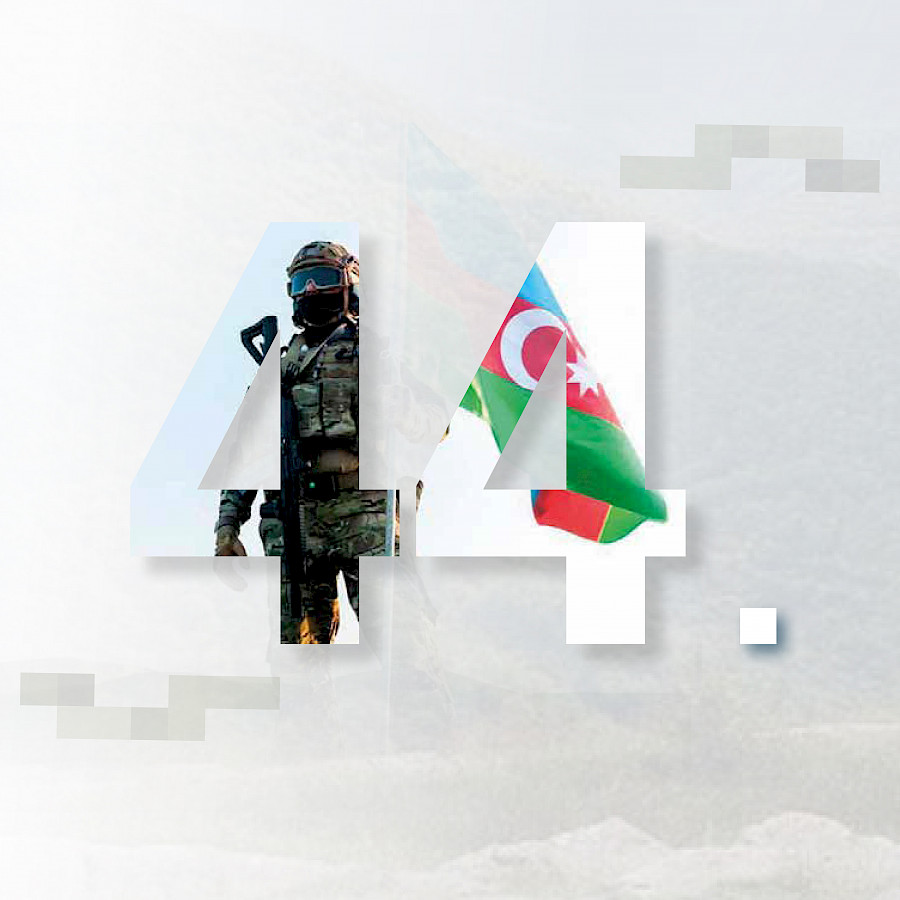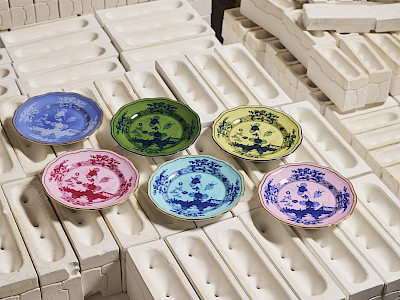
44-day long war for the return of Karabakh to Azerbaijan, was crowned with victory and the restoration of the territorial integrity of our country. We remember the long lines of volunteers at the draft board, the atmosphere of enthusiasm and patriotic rise. And we are proud of our valiant warriors, who returned to people – sometimes at the cost of their life – what rightfully belongs to them: their native land. The heroes of this issue were lucky enough to stay alive, and they are ready to talk about what they've been through. Talk about how war alters characters and changes priorities.
The unbreakable connection of generations
Enver Mirzoyev's great-grandfather, Nasir bek Javanshir, a direct descendant of Karabakh khans, could not bear the news of the fall of Shusha. Today, looking from heaven, he is surely proud of his great-grandson, a participant in the restoration of historical justice. After all, Shusha is the heart of Azerbaijan, and Karabakh is its pearl!
How did you get to the Second Karabakh war?
I was called in the 20th September. The summons came, then we were sent to the unit. The media then reported that they were calling for the reservists training of certain specialties. Reservist-conscripts were sent to the front as necessary. I served 13 years ago, received the specialty "driver – mechanic of an infantry combat vehicle". I was lucky that I was not put on a combat vehicle: it takes time to get acquainted with new generation equipment. Our battalion participated in the breakthrough of the front line, so in the first days it suffered heavy losses. Everything was very close: the post, the trench ahead, the shaft to minimize mortar attack, then the neutral line, if I may call it that, and the enemy behind it! Only the roads were available for walking and driving, because everything around was covered in mines. Although the car on the road was easy to knock out, and in this case the mechanical driver died first...
Please, tell us about the first sortie.
There was a stronghold in the Fizuli district where all of us were located. Our first sortie lasted four days. We were driven along the border zone for a long time to confuse the enemy, there were shelling... We landed five kilometers away from our post. It was impossible to go through in daylight – they fired, so we went on foot, in a column one at a distance of a meter or two from each other. The road went past our positions. And here we go, hands are busy, you get thirsty – the guys run up, open a bottle, wash you up, help you drink... We were very supportive of each other, everyone understood that we were doing a common cause. On the fifth day there was a dispatch again, I was among those left behind. Soon we were headed towards another village, not far from Fizuli, and it turned out that we steamed into the front line: the enemy was on the right and left, and the corridor to get to us was not very wide, it was easy to shot through. We were left to cover the heights and hold positions.
What was your strongest, memorable impression?
We moved forward. Mountains, complex relief, heavy ammunition, plus we picked up someone's bag of ammunition... After 5-10 kilometers, the route became very difficult. One guy and I were a little behind the company. The heat is terrible, and you are in body armor, after half an hour of walking, not only the shirt, but also the blouse was soaking wet. That's the climate there: hot during all day and freezing cold at night. I passed Fizuli, Jabrayil, Hojavend – all the same. In Agdam in October it was already snowy, while we were warm. And here we are, dragging this bag... We approached the hill, behind which supposed to be our last post. Then the soldiers from another part come, saying: follow us, we'll lead you there. And we went towards the hill. Suddenly, a soldier jumps out of the trench and shouts: "Go back!". And at that moment we hear a howl of the shell. The guys went back... And the explosion rattles... I see limbs flying up from behind the hill... I shout to a comrade: "Elvin, run!". He runs away, and after a moment another mortar bomb lands in the place where he was standing...
How did you get injured?
The commander left me in the stronghold for a couple of days to recover. On the second night I woke up and saw the missiles - the enemy decided to check our square. I went to the guys. At this moment, a rocket lands... Explosion... I say: "Guys, something hit me". A shard flew into my stomach, while a boy in one and a half meters from me – got one in the head. It was an utterly dark night. We call him again and again and hear him wheezing. We crawled, turned him over – head injury. We dragged him to a safe place, injected him with a Promedol, called the doctor. But when he was brought to the tent of the field hospital, it turned out that the wound was fatal...
Do you remember the war often?
I try to abstract. After returning, I tried to go to work as soon as possible. It got me a little later. Everyone's psyche is different... A person died in one and a half meters from me, – I dragged him away, smoked and went to sleep. And only the morning after I realized that I was wounded. It must be brain's protective reaction. Then I was hospitalized, declared unfit for further service, but one fragment is still in me... In war, the you go mad instantly. I remember: two friends go to battle – one will soon have a wedding, the other should be his best man. And in front of a friend, the groom gets killed. The survivor was brought in a terrible panic. This does not go away without a trace. I won't go far: we are at a party, we pop the champagne – clap! – and everyone flinches. I became more confident, more serious and at the same time sentimental. I want silence and peace...
Did you make combat friends?
It's a little different kind of friendship. It usually takes couple years to become good friends, but those guys with whom I went through all this I'll trust anything. I admired Lezgins. If you assemble one Lezgin brigade, they will move mountains. Get the knives and move!.. I also met a graduate of the Baku branch of Moscow State University Namik Guliyev – he was a great guy... When we last saw each other, we talked a lot about different things. The next morning, the guys went ahead, and I was left there. A couple of days later, I was injured. And he died. He was buried in the Alley of Honor... The only child in the family, he studied at the Lyceum of Zarifa Aliyeva, his mother works there. We came to the opening of a corner in his honor, but I did not have the heart to approach his mother. Because we're here and he's not anymore...
Is your family related to Karabakh?
My grandmother nee Javanshir, this is the Khan's Karabakh family. Dad's family is also from Shusha, but Mirzoyevs are a simpler surname, they were merchants. I still have a large archive of photographs with prominent personalities not only of Karabakh, but also of former neighboring khanates. My great-grandfather Nasir bek Javanshir was born in 1896. He was friends with Maestro Niyazi, was well educated, knew several languages. At 96, he still had thick hair, his own teeth, good vision and a clear memory. He lived near the Teze Pir mosque, but every day he went on foot to the boulevard to play dominoes with the "guys". Grandmother joked: what guys are you talking about, the youngest is 77! When my father told him in 1992 that Shusha was captured, Nasir bek said: "This is impossible".
He turned on the news, listened, and after that, came down and no longer got up. Exactly three months later, he passed away.
Where did the the news of the end of the war catch you?
It was three in the morning. I slept in the boxes, woke up from a scream, went to the barracks, where everybody was awake! The radio is on, they even got the drum from somewhere. The wonderful "Surge et Ambula" even happened to some of them, because even with crutches the guys were dancing pretty good! The next day, many were discharged.
Did the soldiers feel the support of the people?
The war debunked the myth that money solves everything. You sit in the trench, you want beer or cola - you have the money, but nowhere to buy it. It happened that the guys are not surrounded, and it is still impossible to get to them because of the shelling. We ate what we would find, but even the fruit trees were mined: pick an apple – say goodbye to your leg. It happened that we drank rainwater. It is good that field rations had decontamination pills. And at the slightest opportunity we would receive from city food, chocolates, cigarettes, because even the non-smoker will smoke there... Once the VAZ 2106 arrived, packed with bread. Everybody sent something: socks, warm things, letters! The support was tremendous. A boy from Yardimli wrote: "Hello, dear soldiers. Because of the pandemic, we were transferred to online training, and I saved myself on a new smartphone to study, but you need this money more than I do, so I donated it to the army. They will bring you socks, hats, something else, and I promise that I will learn study". We wept over this letter with the whole crowd. You do not know all these people and you probably won't ever meet them, but it is nice to feel this unity, to realize that everyone in the country supports you, from small to great!
Steep height
The special forces that took the impregnable mountain fortress – Shusha – in incredibly difficult conditions, consist of selected fighters whose physical and moral training has no equal. Sergeant Elnur Abdullayev, who has 11 years of military service, is one of those who returned to Azerbaijan its pride, ancient Shusha.
You're a professional soldier. How did this war start for you personally?
In 2011, at the age of 18, I was called up for military service in the internal troops. Before my service expired, I wrote a report and remained a volunteer. I underwent a training course for service in special forces, participated in training operations. Three were chosen as part of the elite "Yashma", including me. We were sent to battle on the 24th. The offensive began in the direction of Kalbajar, we fought there for four days. Artillery hits, we are given coordinates, our task is to get there and launch a counterattack. Four days later, we were transferred to another area. For some time we stayed there, then, from the 27th, – Fizuli, Jabrayil... The coordinates of enemy tanks and vehicles were transmitted by artillery, and on foot they themselves launched a counterattack. Prisoners were handed over and went on, no stopping or returning - only forward! Day and night there were battles, there were fallen... Not everything can be told...
What fight did you remember as the toughest?
There were no tough ones. What was the fault of the children and old people in the 90s, that they did this to them? When you return their lands step by step, you rejoice. And who's the enemy to stop us? He could not stop us.
You probably didn't even have time to sleep?
If someone says they haven't slept at all, that's not true. Even if you get 5 minutes of free time – you can lie down. Of course, those behind and on the front lines had to act differently. Some people got the supplies and some didn't. It rains in the mountains, you need to change – and there are no dry clothes left. You could be out of food, water. It happened that somewhere the enemy left supplies, things - that's what you use. Maybe it was difficult for someone, but not for me. We needed to fight – we went to fight!
What can you say about the enemy?
They didn't have the courage to meet us face to face. Seeing the approach of our fighters from afar, they threw weapons, helmets, body armor and fled. This has happened more than once. Artillery hit, you go to the enemy post to launch a counterattack, and they do not go to battle, flee. They know that special forces fighters will not give them mercy!
Tell us, please, how you entered Shusha.
The enemy did not expect us to come in from the mountains. We walked for a week, walked through the mountains day and night. You eat poorly, do not sleep, if you stop to rest – you can no longer go, too tired... Three – five – ten minutes of the break – and you continue to go, at a distance of 20-25 steps from each other. When we got up, we saw something like a gazebo, where they drank tea, smoked, thirty-forty people. We threw hand grenades. The explosion! Those who walked behind opened fire at that time. They were shocked from the surprise. I came very close – they saw me literally two meters away. That's where I got a bullet in the left leg. The battle lasted for an hour, they threw all the equipment, left even their wounded and fled. Agil Zeynalli got me out of there... A week later, I found out that he had become a shehid. It was October 21, I remained in Shusha for two days with a wound. It pierced an artery, bleeding is bad. One tourniquet does not hold tight, you apply five – and it still does not help. We were taught to provide self-first aid, because if suddenly you are injured - no one may be around, and if you do not stop the bleeding, you will simply die. Then I was brought to Baku. The condition was serious, there was no blood left in my body, and I fell into a coma. And there were guys who spent three, four, six days with injuries in Shusha. Cars could not drive everywhere, on the road they were mercilessly fired.
As we remember, Shusha was taken on November 8th...
The eighth was announced. But – let's say – those who were ahead were far from the main forces. We were divided by maybe 20 or 30 villages. When the territory was completely occupied, it was announced. It takes time from the moment you enter the area, until all of it is cleaned from the enemy.
How is your treatment going?
I was sent to Ankara, they did the main surgery, I will have another one on the veins in Azerbaijan. They wanted to amputate the leg - I lost too much blood, but another doctor said that it was not necessary. I'm thankful to him. First aid was provided to us in local hospitals, the heaviest cases were sent to Baku. A lot is being done in a hurry, and young guys are 20, 25 years old... If you get amputated, then it must be done this way that you can put on the prosthesis, and you don't suffer. I kind of came to my senses and immediately went back to a coma, for almost ten days. Parents were told - I will not survive...
Did you keep in touch with your family during the war?
In the mountains, the reception is mostly bad. There were often rains, it was cold. You get to some kind of village or city and its electricity is off. To recharge, we used batteries of abandoned enemy cars.
We all remember how in that difficult period our people came together, how they organized the supply of products, clothes, letters to the front. Did the commandos feel this support?
Again, many people fought, the press talks differently, but those who were on the front lines, especially those who have been serving for many years, fighting in the mountains, have their own experience. Even letters reach those who are closer to the rear – but not those who are ahead. Special forces are ahead, followed by internal troops, conscripts, volunteers, even further artillery...
What do you most often remember about this war?
A lot of things... Children who have become shehids often stand before eyes. And when you go to visit the families of the dead colleagues – the tears and words of their mothers remain in memory...
Where will you first go when you return to Karabakh?
Where the battles were, where my colleagues died. Also to place where to where I was wounded. These places will remain in my memory.
Do you dream of war?
It happens that I see fighting comrades in my dream... They ask for something, ask for help...
Without fear and reproach
Special forces captain Elvin Mammadov on October 29, 2020, right at the front, found out that he had a second child. He with a detachment of special forces passed all of Karabakh, more than once received serious injuries. For the courage shown in the battles, Elvin Mammadov was awarded the Order of the Azerbaijan Banner, the third-degree medal "For Distinction in Military Service".
Please tell us about yourself. Where are you from?
I am from Nakhchivan. I finished school there, was a cadet of the military lyceum for three years, in 2008 I entered the Azerbaijan Higher Military School in Baku, where I studied for four years. In 2013 I graduated from TEC (Training and Education center of The Armed Forces), then took a one-year course there as an officer, served in a military unit in Gazakh. In May 2014 I was enlisted in special forces.
Why did you decide to become a military man?
My brother is also a military man, in 2016 he graduated from the Academy of the Ministry of National Security. We grew up in a patriotic family, love for our native country led us to the army.
How did the Second Karabakh War start for you personally?
We received information about the provocative actions of the enemy, and on September 26 it became known that the enemy was preparing to attack. We were taken to the designated area, on the 27th we marched in the direction of Kalbajar. In four days, we destroyed the enemy forces and disabled all enemy equipment in the direction of Garagol.
Tell us how you and your fighters set the flag of Azerbaijan in Fizuli.
We went on a counterattack and released Fizuli, but could not find a single whole house to set the flag. Me and two other soldiers climbed to a height, enemy snipers and mortars immediately opened fire on us. But we still installed it. The flag fought so hard in the wind that even snipers could not hit it. Then the enemy went on the offensive, and we brought him closer and destroyed.
Did you get a lot of injuries?
I was badly contused in battle three times. In Fizuli, tank missiles were used against us. One such rocket threw me five to six meters, after the second volley bricks fell on my head. The blow was strong, I was shell-shocked, did not hear or see anything. I spent six hours in this state, then I gradually recovered. They sent for me to get out of the battlefield, but I did not leave my comrades. In the Khojavend direction, heavy fire was opened on us with mines and tank missiles, the scout near me was literally crushed, and again I was thrown aside in a wave. And again I came to my senses, but since it wasn't my first wound, I was in a bad state. I still experience headaches, palpitations and other consequences of these injuries.
Did you make it to Shusha?
Yes. We had no equipment and walked through Jabrayil, Fizuli, Khojavend and reached Shusha. We had to go to the enemy's rear. I took the squad and walked in from Lachin's side. The Lachin corridor at an altitude of 70-80 meters was fired from the mountain. But I constantly received orders to move forward and was forced to give the command to go through this corridor. During the shelling, a 7.62-mm bullet pierced my jaw right through. I tied up my jaw so that it would not hang out, and only then I injected myself with painkiller... We spent three days in the Lachin corridor, two more – below. Drugs effect lasts for no more than two hours... Then I felt what it was like to want to die because of pain. No one could help us: we were away from everyone, in the mountains, Shusha had not yet been taken, it was two kilometers away... On November 7, me and 40 other people finally went to their posts, but they could not get us out of there yet – all the roads were mined. I remembered how we went there, and I brought my people out the same way. Then I spent a month in intensive care...
Which fight for you was the hardest?
For me and my colleagues there was no such fight. Even if the enemy was super-powerful, we have waited thirty years for this moment! I will say this: due to difficult weather conditions, it took some time to break through the enemy defense in the Jabrayil direction – rains interfered with our actions, the enemy holed up in the fortification. But still we did it!



